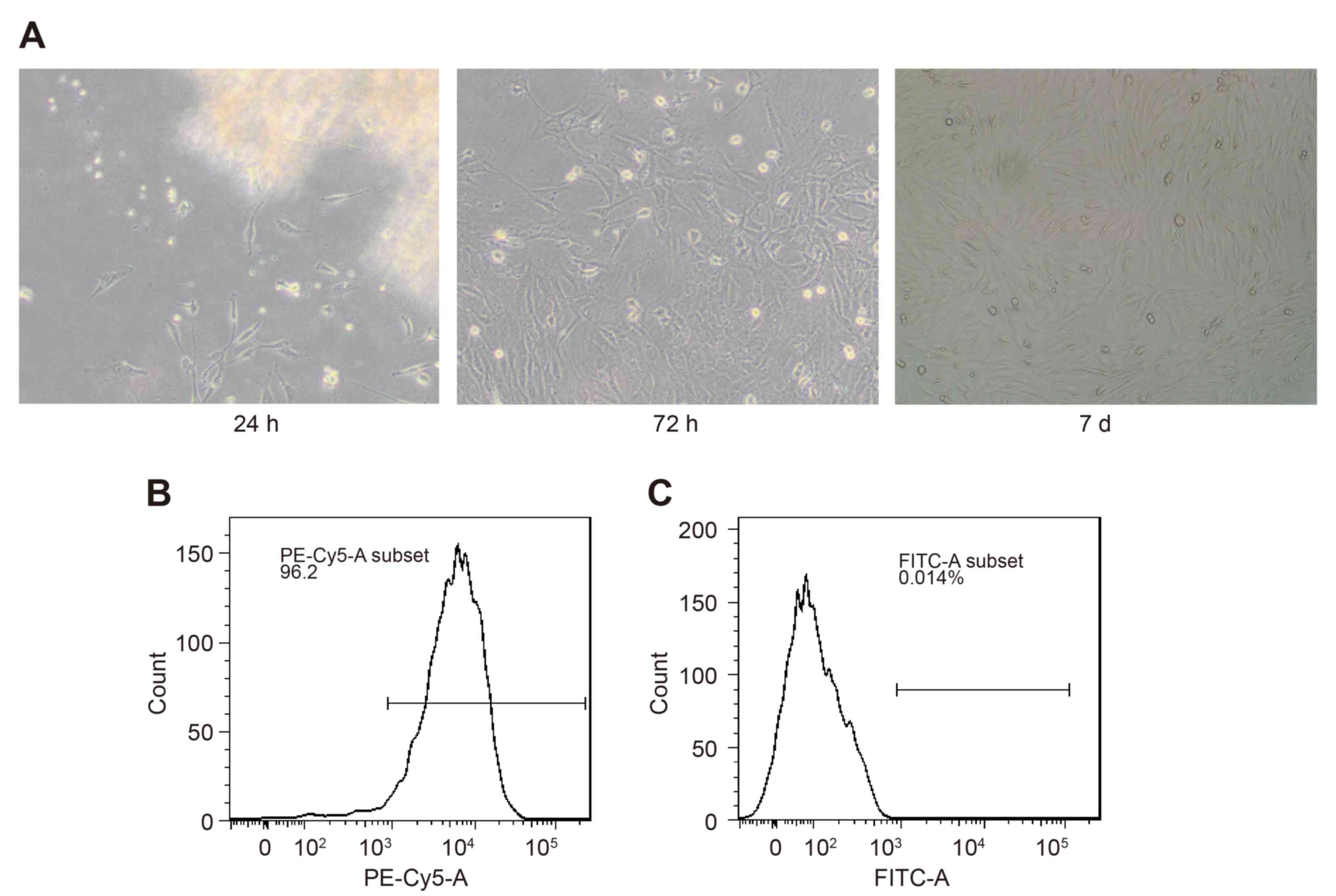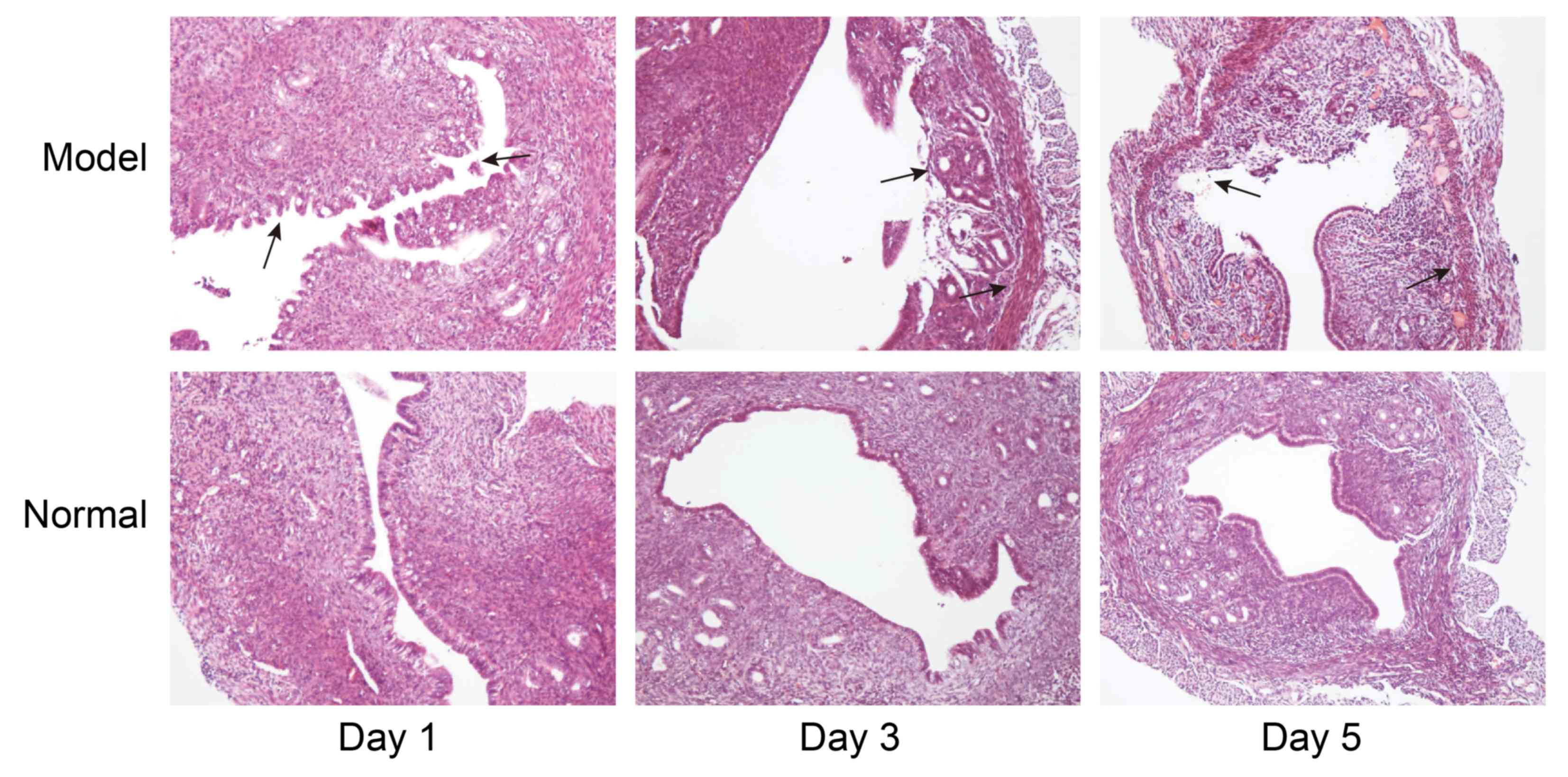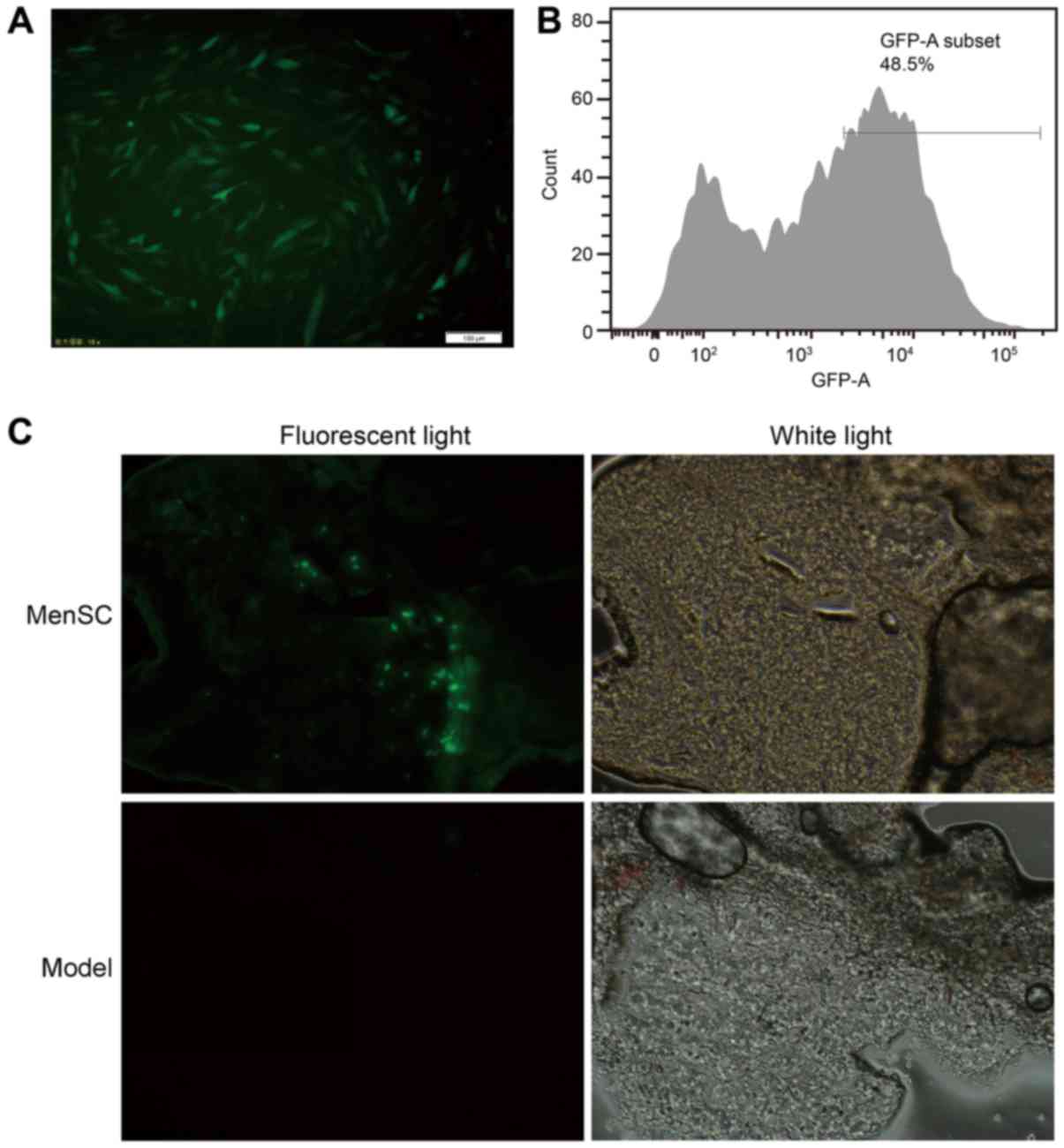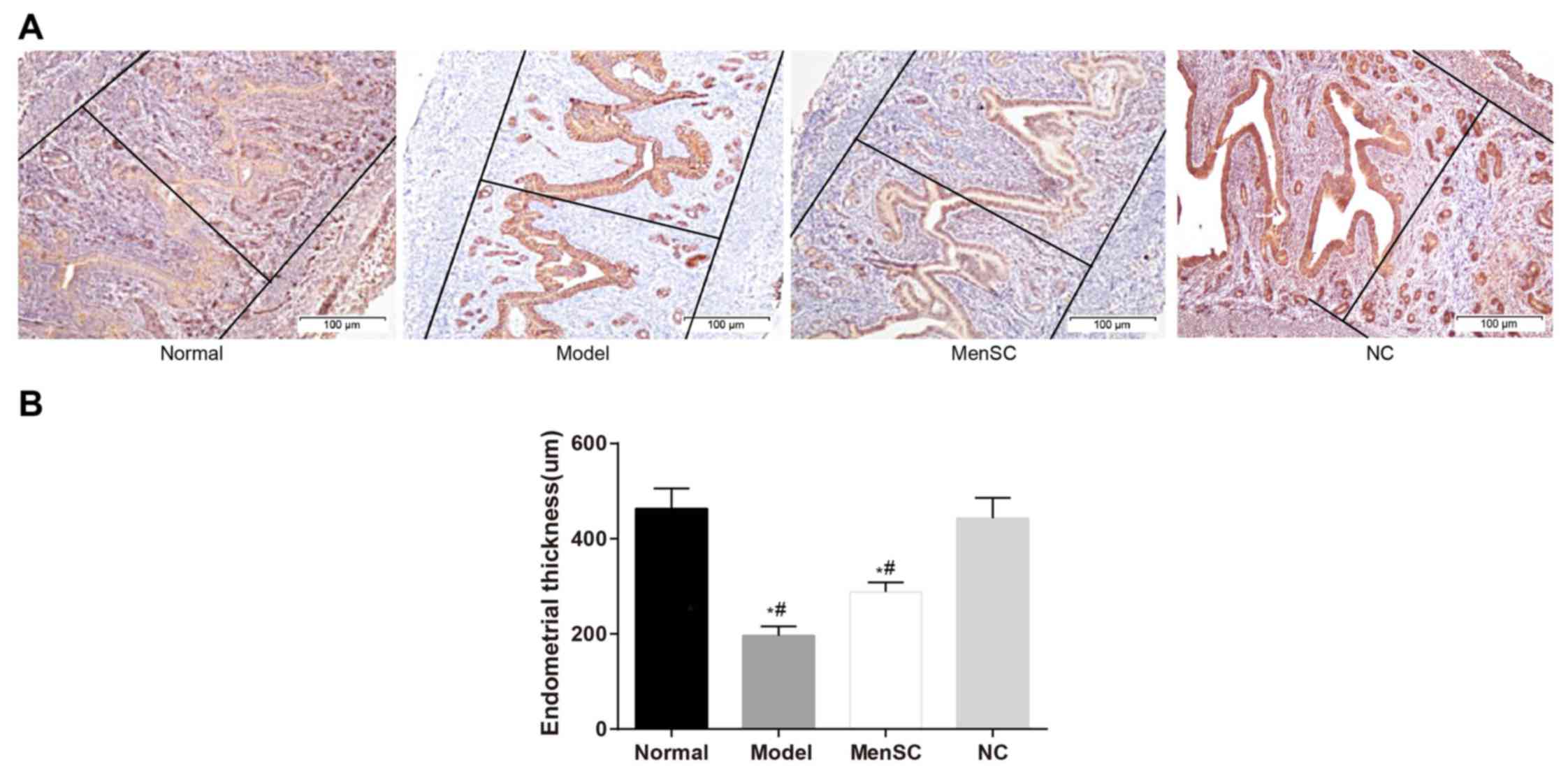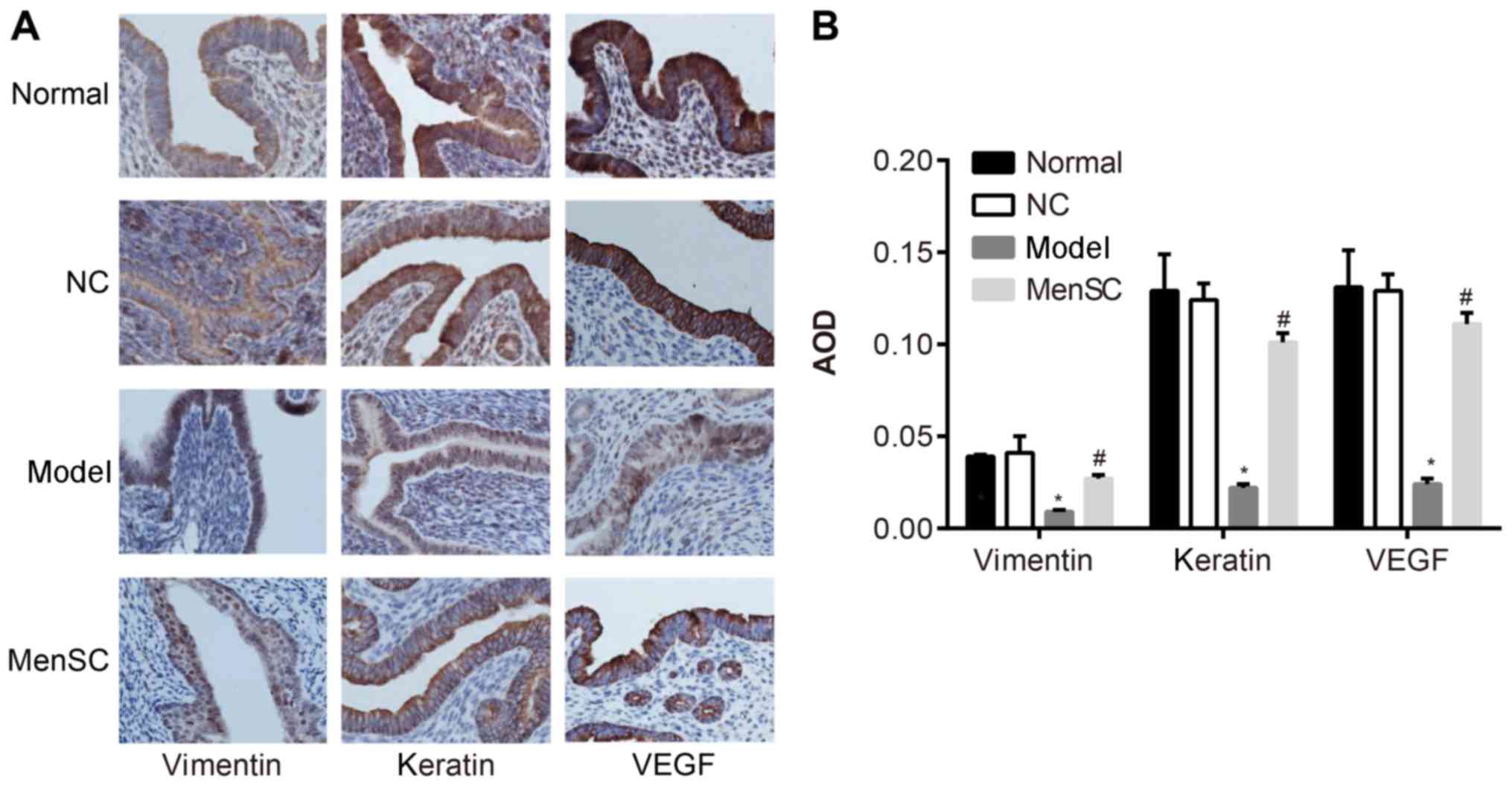|
1
|
Fiocchi F, Nocetti L, Siopis E, Currà S,
Costi T, Ligabue G and Torricelli P: In vivo 3 T MR diffusion
tensor imaging for detection of the fibre architecture of the human
uterus: A feasibility and quantitative study. Br J Radiol.
85:e1009–e1017. 2012. View Article : Google Scholar : PubMed/NCBI
|
|
2
|
Maryam KS, Christopher MR, Ahmad H and
Valojerdi RM: Ultrastructural modifications of human endometrium
during the window of implantation. Int J Fertil Steril. 2:44–59.
2008.
|
|
3
|
Hyodo S, Matsubara K, Kameda K and
Matsubara Y: Endometrial injury increases side population cells in
the uterine endometrium: A decisive role of estrogen. Tohoku J Exp
Med. 224:47–55. 2011. View Article : Google Scholar : PubMed/NCBI
|
|
4
|
Davies D, Meade KG, Herath S, Eckersall
PD, Gonzalez D, White JO, Conlan RS, O'Farrelly C and Sheldon IM:
Toll-like receptor and antimicrobial peptide expression in the
bovine endometrium. Reprod Biol Endocrinol. 6:532008. View Article : Google Scholar : PubMed/NCBI
|
|
5
|
Deans R and Abbott J: Review of
intrauterine adhesions. J Minim Invasive Gynecol. 17:555–569. 2010.
View Article : Google Scholar : PubMed/NCBI
|
|
6
|
Mahajan N and Sharma S: The endometrium in
assisted reproductive technology: How thin is thin? J Hum Reprod
Sci. 9:3–8. 2016. View Article : Google Scholar : PubMed/NCBI
|
|
7
|
Chen JR, Cheng JG, Shatzer T, Sewell L,
Hernandez L and Stewart CL: Leukemia inhibitory factor can
substitute for nidatory estrogen and is essential to inducing a
receptive uterus for implantation but is not essential for
subsequent embryogenesis. Endocrinology. 141:4365–4372. 2000.
View Article : Google Scholar : PubMed/NCBI
|
|
8
|
Santjohanser C, Knieper C, Franz C, Hirv
K, Meri O, Schleyer M, Würfel W and Toth B: Granulocyte-colony
stimulating factor as treatment option in patients with recurrent
miscarriage. Arch Immunol Ther Exp (Warsz). 61:159–164. 2013.
View Article : Google Scholar : PubMed/NCBI
|
|
9
|
Fossett E, Khan WS, Longo UG and Smitham
PJ: Effect of age and gender on cell proliferation and cell surface
characterization of synovial fat pad derived mesenchymal stem
cells. J Orthop Res. 30:1013–1018. 2012. View Article : Google Scholar : PubMed/NCBI
|
|
10
|
Wang J, Ju B, Pan C, Gu Y and Zhang Y, Sun
L, Zhang B and Zhang Y: Application of bone marrow-derived
mesenchymal stem cells in the treatment of intrauterine adhesions
in rats. Cell Physiol Biochem. 39:1553–1560. 2016. View Article : Google Scholar : PubMed/NCBI
|
|
11
|
Song T, Zhao X, Sun H, Li X, Lin N, Ding
L, Dai J and Hu Y: Regeneration of uterine horns in rats using
collagen scaffolds loaded with human embryonic stem cell-derived
endometrium-like cells. Tissue Eng Part A. 21:353–361. 2015.
View Article : Google Scholar : PubMed/NCBI
|
|
12
|
Darzi S, Werkmeister JA, Deane JA and
Gargett CE: Identification and characterization of human
endometrial mesenchymal stem/stromal cells and their potential for
cellular therapy. Stem Cells Transl Med. 5:1127–1132. 2016.
View Article : Google Scholar : PubMed/NCBI
|
|
13
|
Huang P, Lin LM, Wu XY, Tang QL, Feng XY,
Lin GY, Lin X, Wang HW, Huang TH and Ma L: Differentiation of human
umbilical cord Wharton's jelly-derived mesenchymal stem cells into
germ-like cells in vitro. J Cell Biochem. 109:747–754.
2010.PubMed/NCBI
|
|
14
|
Figueira PG, Abrão MS, Krikun G and Taylor
HS: Stem cells in endometrium and their role in the pathogenesis of
endometriosis. Ann N Y Acad Sci. 1221:10–17. 2011. View Article : Google Scholar : PubMed/NCBI
|
|
15
|
Xu S, Chan RWS, Ng EHY and Yeung WSB:
Spatial and temporal characterization of endometrial mesenchymal
stem-like cells activity during the menstrual cycle. Exp Cell Res.
350:184–189. 2017. View Article : Google Scholar : PubMed/NCBI
|
|
16
|
Phermthai T, Tungprasertpol K,
Julavijitphong S, Pokathikorn P, Thongbopit S and Wichitwiengrat S:
Successful derivation of xeno-free mesenchymal stem cell lines from
endometrium of infertile women. Reprod Biol. 16:261–268. 2016.
View Article : Google Scholar : PubMed/NCBI
|
|
17
|
Schwab KE and Gargett CE: Co-expression of
two perivascular cell markers isolates mesenchymal stem-like cells
from human endometrium. Hum Reprod. 22:2903–2911. 2007. View Article : Google Scholar : PubMed/NCBI
|
|
18
|
Musina RA, Belyavski AV, Tarusova OV,
Solovyova EV and Sukhikh GT: Endometrial mesenchymal stem cells
isolated from the menstrual blood. Bull Exp Biol Med. 145:539–543.
2008. View Article : Google Scholar : PubMed/NCBI
|
|
19
|
Zhu H, Jiang Y, Pan Y, Shi L and Zhang S:
Human menstrual blood-derived stem cells promote the repair of
impaired endometrial stromal cells by activating the p38 MAPK and
AKT signaling pathways. Reprod Biol. 18:274–281. 2018. View Article : Google Scholar : PubMed/NCBI
|
|
20
|
Jones-Bolin S: Guidelines for the care and
use of laboratory animals in biomedical research. Curr Protoc
Pharmacol Appendix. 4:Appendix 4B. 2012. View Article : Google Scholar
|
|
21
|
Liu T, Huang Y, Zhang J, Qin W, Chi H,
Chen J, Yu Z and Chen C: Transplantation of human menstrual blood
stem cells to treat premature ovarian failure in mouse model. Stem
Cells Dev. 23:1548–1557. 2014. View Article : Google Scholar : PubMed/NCBI
|
|
22
|
Velez-delValle C, Marsch-Moreno M,
Castro-Muñozledo F, Galván-Mendoza IJ and Kuri-Harcuch W:
Epithelial cell migration requires the interaction between the
vimentin and keratin intermediate filaments. Sci Rep. 6:243892016.
View Article : Google Scholar : PubMed/NCBI
|
|
23
|
Rosenbaum-Dekel Y, Fuchs A, Yakirevich E,
Azriel A, Mazareb S, Resnick MB and Levi BZ: Nuclear localization
of long-VEGF is associated with hypoxia and tumor angiogenesis.
Biochem Biophys Res Commun. 332:271–278. 2005. View Article : Google Scholar : PubMed/NCBI
|
|
24
|
Chakrabarti J, Chatterjee R, Goswami S,
Chakravarty B and Kabir SN: Overt leptin response to controlled
ovarian hyperstimulation negatively correlates with pregnancy
outcome in in vitro fertilization-embryo transfer cycle. J Hum
Reprod Sci. 5:194–199. 2012. View Article : Google Scholar : PubMed/NCBI
|
|
25
|
Chien LW, Au HK, Chen PL, Xiao J and Tzeng
CR: Assessment of uterine receptivity by the
endometrial-subendometrial blood flow distribution pattern in women
undergoing in vitro fertilization-embryo transfer. Fertil Steril.
78:245–251. 2002. View Article : Google Scholar : PubMed/NCBI
|
|
26
|
Aydin T, Kara M and Nurettin T:
Relationship between endometrial thickness and in vitro
fertilization-intracytoplasmic sperm injection outcome. Int J
Fertil Steril. 7:29–34. 2013.PubMed/NCBI
|
|
27
|
Chen SL, Wu FR, Luo C, Chen X, Shi XY,
Zheng HY and Ni YP: Combined analysis of endometrial thickness and
pattern in predicting outcome of in vitro fertilization and embryo
transfer: A retrospective cohort study. Reprod Biol Endocrinol.
8:302010. View Article : Google Scholar : PubMed/NCBI
|
|
28
|
Alawadhi F, Du H, Cakmak H and Taylor HS:
Bone Marrow-Derived Stem Cell (BMDSC) transplantation improves
fertility in a murine model of Asherman's syndrome. PLoS One.
9:e966622014. View Article : Google Scholar : PubMed/NCBI
|
|
29
|
Jiang YS, Zhu HY, Jin XY, Li C, Li J,
Zhang YL and Zhang SY: Co-culture with endometrial stromal cells
promotes the differentiation of menstrual blood-derived mesenchymal
stem cells into endometrial epithelial cells. Zhonghua Yi Xue Za
Zhi. 97:2614–2619. 2017.(In Chinese). PubMed/NCBI
|
|
30
|
Mehrabani D, Nazarabadi RB, Kasraeian M,
Tamadon A, Dianatpour M, Vahdati A, Zare S and Ghobadi F: Growth
kinetics, characterization, and plasticity of human menstrual blood
stem cells. Iran J Med Sci. 41:132–139. 2016.PubMed/NCBI
|
|
31
|
Tsuji S, Yoshimoto M, Takahashi K, Noda Y,
Nakahata T and Heike T: Side population cells contribute to the
genesis of human endometrium. Fertil Steril. 90 Suppl
4:S1528–S1537. 2008. View Article : Google Scholar
|
|
32
|
Hu X, Lin X, Jiang Y, Shi L, Wang J, Zhao
L and Zhang S: Establishment of mouse endometrial injury model by
electrocoagulation. Zhonghua Yi Xue Za Zhi. 94:3771–3773. 2014.(In
Chinese). PubMed/NCBI
|
|
33
|
Miwa I, Tamura H, Takasaki A, Yamagata Y,
Shimamura K and Sugino N: Pathophysiologic features of ‘thin’
endometrium. Fertil Steril. 91:998–1004. 2009. View Article : Google Scholar : PubMed/NCBI
|
|
34
|
Zhang Y, Lin X, Dai Y, Hu X, Zhu H, Jiang
Y and Zhang S: Endometrial stem cells repair injured endometrium
and induce angiogenesis via AKT and ERK pathways. Reproduction.
152:389–402. 2016. View Article : Google Scholar : PubMed/NCBI
|
|
35
|
Zhou J, Tao D, Xu Q, Gao Z and Tang D:
Expression of E-cadherin and vimentin in oral squamous cell
carcinoma. Int J Clin Exp Pathol. 8:3150–3154. 2015.PubMed/NCBI
|
|
36
|
Yang F, Tang X, Riquelme E, Behrens C,
Nilsson MB, Giri U, Varella-Garcia M, Byers LA, Lin HY, Wang J, et
al: Increased VEGFR-2 gene copy is associated with chemoresistance
and shorter survival in patients with non-small-cell lung carcinoma
who receive adjuvant chemotherapy. Cancer Res. 71:5512–5521. 2011.
View Article : Google Scholar : PubMed/NCBI
|
|
37
|
Torabinia N, Razavi SM and Tahririan D:
Vascular Endothelial Growth Factor (VEGF) expression in normal,
dysplastic and neoplastic squamous epithelium of oral mucosa. J
Pioneer Med Sci. 4:115–118. 2014.
|
|
38
|
Vlahos NF, Gregoriou O, Deliveliotou A,
Perrea D, Vlachos A, Zhao Y, Lai J and Creatsas G: Effect of
pentoxifylline on vascular endothelial growth factor C and flk-1
expression on endometrial implants in the rat endometriosis model.
Fertil Steril. 93:1316–1323. 2010. View Article : Google Scholar : PubMed/NCBI
|
|
39
|
Le AW, Wang ZH, Dai XY, Xiao TH, Zhuo R,
Zhang BZ, Xiao ZL and Fang XJ: An experimental study on the use of
icariin for improving thickness of thin endometrium. Genet Mol Res.
16:2017. View Article : Google Scholar : PubMed/NCBI
|
|
40
|
Karantza V: Keratins in health and cancer:
More than mere epithelial cell markers. Oncogene. 30:127–138. 2011.
View Article : Google Scholar : PubMed/NCBI
|
|
41
|
Ikoma T, Kyo S, Maida Y, Ozaki S, Takakura
M, Nakao S and Inoue M: Bone marrow-derived cells from male donors
can compose endometrial glands in female transplant recipients. Am
J Obstet Gynecol. 201:608.e1–e8. 2009. View Article : Google Scholar
|















